The ultimate travel marketing strategy guide
Discover the ultimate travel marketing tactics to succeed and stay ahead.

The importance of getting your marketing right in the travel sector is at an all-time high. Social media and influencers have helped make the world more visible than ever before. Consumers are turning to social channels as a source of inspiration. They’re hunting for the next trending destination and best travel deals.
On top of this, there has been a much-needed post-COVID travel boom. So-called ‘revenge holidays’ are in full swing and worldwide tourist arrivals are expected to reach up to 95% of pre-pandemic levels. It finally looks like things are getting back to normal and opportunities are everywhere.
But competition is growing. Standing out from the crowd is becoming increasingly difficult and keeping travelers engaged enough to complete the checkout process is a challenge.
At the same time, there are question marks over how long this travel boom will last. Staffing issues, the cost of fuel and energy, and uncertainty around the cost of living are causing concern for travelers and travel marketers alike.
In this ultimate guide, we will have a look at the current state of the travel marketing landscape and break down all the channels and tactics you need to utilize to succeed in the highly competitive sectorwere
What is travel marketing and why is it important?
People are always dreaming of their next vacation, surely that means travel brands basically sell themselves, right?
Unfortunately, not. How brands market themselves is what makes travelers choose one resort and airline over another. Travel brands must promote and sell their products, services, and experiences to customers. You need to showcase the distinctive features of your destination, accommodation, leisure activities, and travel packages to spark interest and motivate bookings.
The travel industry is vast and continuously evolving. Some of the primary types of businesses that make up the industry include:
- Airlines
- Train operators
- Cruise liners
- Bus companies
- Car rental agencies
- Hotels and resorts
- Hostels
- Bed & breakfasts (B&B)
- Vacation rentals (e.g. Airbnb, VRBO)
- Camping and glamping sites
- Travel agencies (online and offline)
- Tour operators
- Online travel agencies (OTAs)
- Travel management companies (TMCs)
- Travel insurance providers
- Guided tours and sightseeing excursions
- Adventure activities and sports (e.g. skiing, scuba diving)
- Museums, galleries, and cultural centers
- Theme parks and amusement parks
- Restaurants, bars, and cafes
- National tourism boards
- Regional and state tourism offices
- City visitor bureaus
- Travel booking and comparison sites
- Mobile applications for travel planning and navigation
- Travel review and recommendation sites (e.g. TripAdvisor)
- Metasearch engines for flights, hotels, and car rentals (e.g. Kayak, Skyscanner)
Why is marketing in the travel industry important?
Marketing is an indispensable tool for travel brands. Without it, you would struggle to achieve your business goals. Effective marketing can help you attract more customers, increase your revenue, and establish a strong brand.
What are the benefits of travel marketing?
- Increased visibility: Marketing helps significantly to increase your brand’s exposure. This ensures that potential customers are aware of the travel services and experiences you offer and boosts overall visibility in the crowded marketplace.
- Customer acquisition: A well-executed marketing campaign attracts new customers by showcasing the value and unique aspects of your travel business, ultimately driving revenue growth.
- Improved customer retention: Marketing enables your travel brand to maintain long-term relationships with your existing customers by offering personalized and contextually relevant content and engaging with them consistently across channels.
- Enhanced customer loyalty: Including loyalty programs, exclusive offers, and personalized promotions in your marketing can build customer loyalty, leading to repeat business and higher customer lifetime value (CLV).
- Competitive advantage: Innovative and targeted marketing strategies can help your travel brand stand out from the competition, positioning you as a leader and providing an advantage in a highly competitive market.
- Increased revenue: Marketing can be used to generate upselling and cross-selling opportunities, increasing the average transaction value and ultimately resulting in higher revenue.
- Improved brand reputation: Using marketing, you can manage your online presence, customer reviews, and social media engagement. This positively influences your brand reputation, driving more business from potential customers who trust and value your brand.
- Informed decision-making: Leveraging data collected through your marketing activities for analysis and insights can help your business make informed decisions about product and service offerings, and marketing strategies, allowing you to optimize your efforts and boost performance.
- Expansion into new markets: Marketing can play a critical role in identifying new potential markets, demographics, and customer segments to target, enabling you to expand your reach and tap into new growth opportunities.
- Adaptability and resilience: Marketing enables you to react quickly to unpredictable events, market trends, and competitive moves, adapting your strategies to maintain customer engagement and drive bookings while ensuring resilience in the face of challenges.
Need to know marketing statistics for the travel industry
In today’s complicated and dynamic digital world, you must do all you can to understand the intricacies of the travel industry. Using these statistics, you will be able to get a bird’s eye view of global trends, customer behavior trends, and forces that are set to drive the multibillion-dollar industry forward in the years to come.
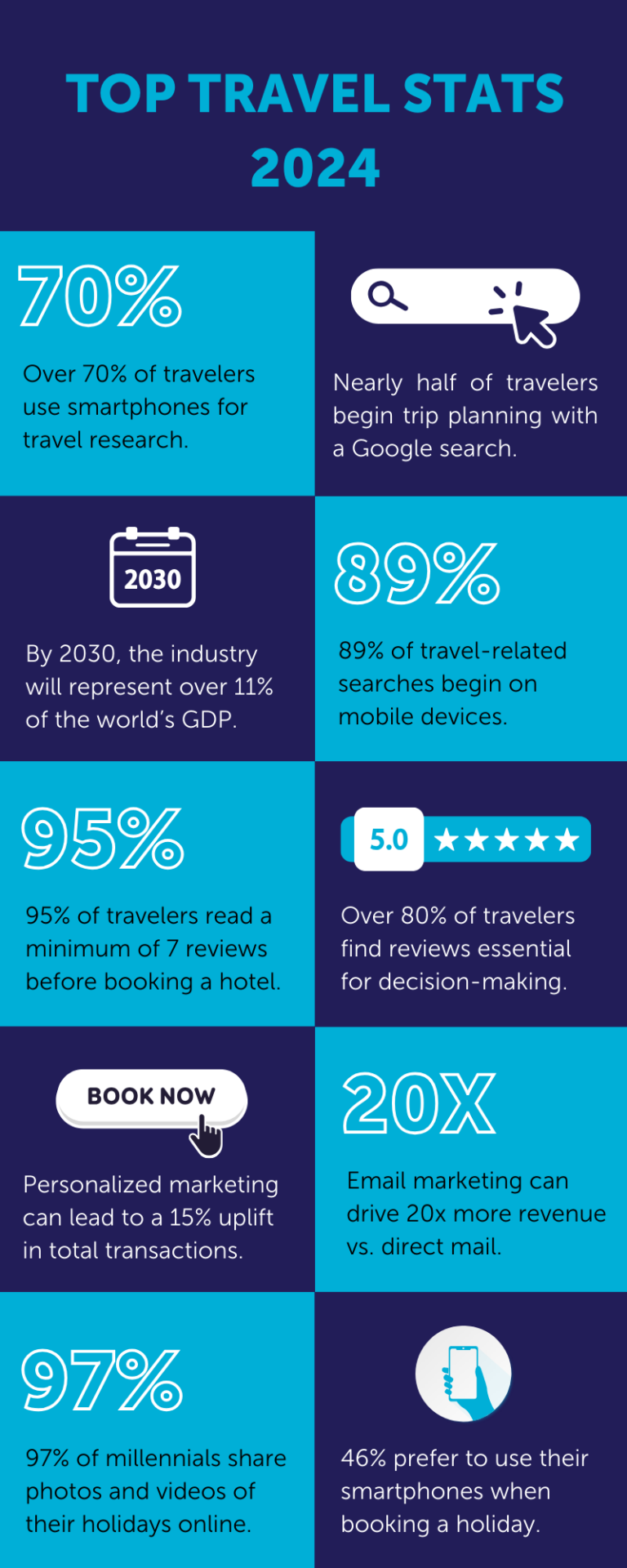
What are the challenges of travel marketing?
Despite economic uncertainty and the lasting impact of the pandemic, the travel industry is returning to pre-pandemic levels and enjoying steady growth.
Still, airlines, hotels, travel agencies, and other travel brands across the world are facing unique challenges that set you apart from typical marketing teams. In the ever-changing world of travel marketing, you have your hands full keeping up with the latest trends and technological advancements. Below are just a few of the top challenges you’re facing on an almost daily basis and how to overcome them.
With inflation in flux and travel expenses rising, travelers now consider price to be their top priority. To connect with your audience, you should emphasize low rates and demonstrate high value. Promoting discounts, bundles, and loyalty programs will appeal to budget-conscious consumers.
As remote work, digital engagement, and eco-consciousness continue to impact customer behaviors, you need to stay on top of trends to cater to emerging segments like bleisure (business and leisure) travelers. Data-centric platforms like Dotdigital plug into CRM systems and use machine learning can help brands understand these new customer groups.
With 86% of travelers seeking personalized experiences, you need to create tailored campaigns that resonate with your audience. Data collection and integration with CRM platforms are essential for delivering enjoyable, relevant, and personalized marketing experiences.
By understanding and following emerging travel trends, you can engage with audiences throughout the whole customer journey. You need to approach the journey holistically and create a cohesive experience across channels. Tools like single customer view (SCV) and eRFM will help you get a clearer view of travelers’ behavior.
To maintain your competitive edge, you must offer a seamless, efficient experience for customers, from booking to post-break feedback. You should tap into technology to adapt to market changes. Ensuring data quality and consolidation will help you reap the full benefits of new tech advancements.
To cater to your more environmentally-conscious travelers, you need to demonstrate a genuine commitment to sustainable practices. Avoiding greenwashing and adopting eco-friendly practices help you align your campaigns with customer values and support a greener future.
How to build a successful travel marketing strategy
Building a successful travel marketing strategy involves careful planning, targeting the right audience, and effectively leveraging your various marketing channels. Here’s a step-by-step guide to creating a winning travel marketing strategy:
Step 1: Define your target audience
Start by clearly defining your target audience. Conduct market research to determine their demographics, preferences, and behaviors. This will help you tailor your marketing materials to resonate with this specific group and achieve better results.
Step 2: Develop a strong brand identity
Create a memorable and eye-catching brand identity that encapsulates your company’s ethos and values. This includes your company name, logo, tagline, color scheme, and visual style. Consistency across all marketing channels reinforces brand recognition and establishes trust.
Step 3: Optimize your online presence
Create a user-friendly website that provides relevant information, showcases your offerings, and guides visitors to conversions (i.e. bookings or inquiries). Ensure your website has strong SEO to improve search engine ranking. Utilize social media platforms to engage with your audience and share valuable content.
Step 4: Leverage content marketing
Produce high-quality, informative, and engaging content that inspires travelers and provides value. This could include blog articles, videos, or destination guides. Diversifying your content not only keeps your audience interested but also addresses different stages of their customer journey.
Step 5: Monitor, analyze, and adapt
Implement analytics tools to track your marketing efforts and identify what works best. Monitor key performance indicators (KPIs) and adjust your strategy accordingly to optimize results. By continually learning from your data, you can make informed decisions and enhance your marketing effectiveness.
Boost growth with cutting-edge marketing technology
To enhance your visibility, captivate travelers, and boost bookings and inquiries, it’s essential to tap into the technology you have available. For peak success in the travel sector, you need technology that collaborates seamlessly with your existing tech solutions.
Dotdigital’s customer experience and data platform (CXDP) delivers an array of travel marketing tools and channels through a unified, all-encompassing platform. By maximizing your technology usage, you can elevate traveler engagement, increase bookings, and optimize your travel marketing initiatives.
Email marketing for travel marketers
Email marketing is a powerful tool for the travel industry, as it enables you to reach your target audience, build lasting relationships, and drive conversions.
In this section, we’ll explore the benefits of email marketing and the essential elements of successful email marketing for travel businesses, including creating targeted campaigns, utilizing data to send personalized content, and ensuring that emails are engaging and mobile-friendly.
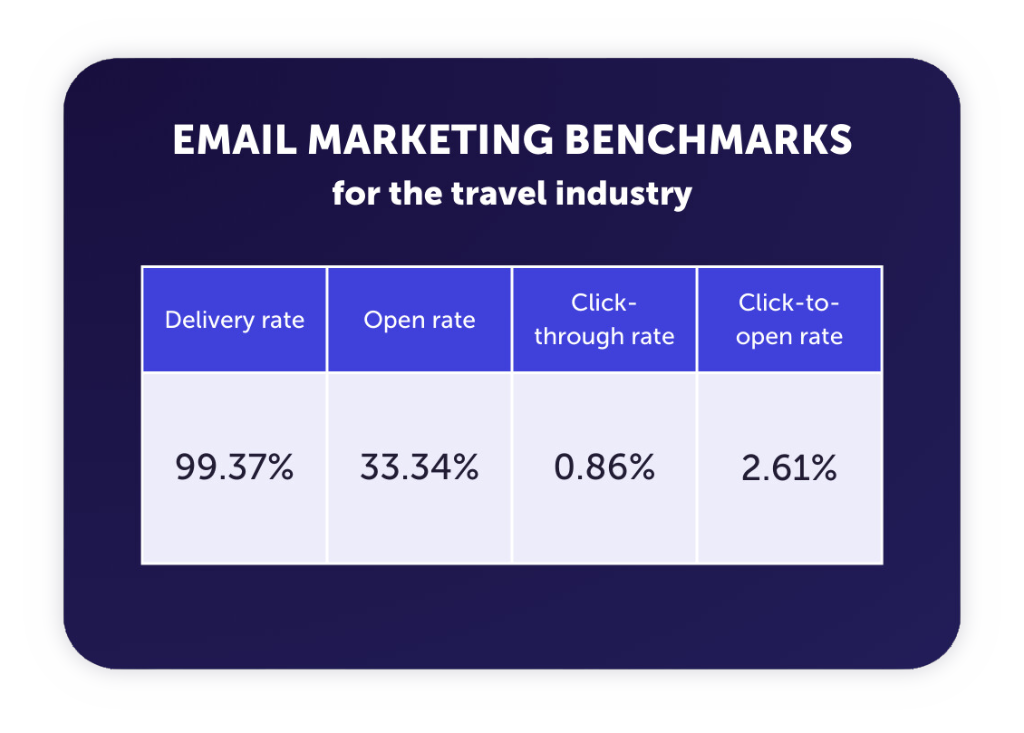
The benefits of email marketing for travel brands
Email marketing is an essential tool for marketers in the travel industry for several reasons:
1. Direct communication channel
Email marketing is a direct line of communication with your target audience, allowing you to share news, updates, offers, and content straight to subscribers’ inboxes, enhancing engagement and nurturing long-term relationships.
2. Strong ROI
Compared to other forms of marketing in the travel sector, email marketing is relatively inexpensive while maintaining a high return on investment (ROI). This makes it one of the best options for travel brands looking to reach large audiences or target specific segments without breaking the bank.
3. Personalization capabilities
Email marketing enables you to create perfectly personalized content and offers based on your subscriber’s demographics, preferences, and travel or engagement history. Ultimately, personalization leads to increased customer satisfaction and loyalty, as your audience feels catered to and valued by your brand.
4. Behavioral targeting
With email marketing campaigns, you can track various metrics such as open rates, click-through rates, and conversions, allowing a better understanding of travelers’ behaviors and preferences. This valuable information can be utilized to optimize future campaigns, ensuring better audience targeting and fostering long-term customer relationships.
5. Urgency and exclusivity
You can use email marketing to create a sense of urgency through time-sensitive offers, limited promotions, and exclusive deals, encouraging customers to book their travel or upgrade reservations.
6. Increased customer retention
By regularly sending informative content, helpful resources, and engaging promotions through email marketing campaigns, you will nurture customer loyalty and increase repeat bookings over time.
7. Relevance and timeliness
Email campaigns can be triggered based on specific events or customer actions, ensuring that the content is relevant and timely as per each individual’s needs. This could include sending reminder emails about upcoming trips or limited-time promotions resulting in better engagements and more conversions.
Email marketing best practice for travel marketers
Travel marketers can employ these best practices to create effective and engaging email campaigns:
Write catchy and enticing subject lines to increase open rates. Make your subject line relevant to the email’s content, and ensure it resonates with your target audience. Tap into the power of generative AI to really save time and improve results.
Personalize your email campaigns by using the recipient’s first name and providing recommendations, content, or offers based on their preferences, travel history, or demographics.
Divide your subscribers into targeted segments based on factors such as geographical location, interests, booking history, or language, and send tailored content that appeals to each segment’s unique attributes.
Embed high-quality images and videos of destinations, accommodations, or activities to inspire and evoke emotions, leading to higher engagement levels.
Make your CTAs clear, concise, and visually emphasized, directing subscribers toward the desired action, such as visiting a web page, booking a travel package, or redeeming special offers.
Ensure that your email template is mobile-friendly, with easy-to-read text and a clean layout, as a large portion of your audience will likely read your emails on mobile devices.
Aim to provide valuable, informative, and engaging content that relates to the interests and needs of your subscribers, building trust and fostering lasting customer relationships.
A/B test various elements of your emails, such as subject lines, send times, layout, or content, to determine what generates higher engagement and conversions. Continuously optimize your campaigns based on the insights gained from these tests.
Keep track of key email marketing metrics such as open rates, click-through rates, conversion rates, and unsubscribe rates to measure the effectiveness of your campaigns and identify areas for improvement.
Regularly review and clean your email list, removing inactive subscribers or outdated addresses to improve deliverability and maintain a high-quality mailing list.
Segmentation strategies for travel marketers
Segmentation is a crucial tactic for all marketers, but none more so than marketers in the travel sector. It involves dividing your target audience into distinct groups based on their preferences, demographics, or behaviors.
Implementing a segmentation strategy allows you to create highly targeted marketing campaigns that resonate better with each group, ultimately driving higher customer engagement and conversions.
Top five benefits of segmentation
1. Targeted marketing messages
Segmentation allows you to tailor your marketing messages and content to specific segments, resulting in greater relevance, customer engagement, and conversion rates.
2. Improved customer experience
Offering personalized content, recommendations, and offers based on segmentation fosters a better customer experience, deepening brand loyalty, and strengthening long-term relationships.
3. Resource allocation
By focusing marketing resources on specific customer segments, you can effectively allocate your budget, time, and efforts, ensuring maximum impact for your marketing activities. eRFM customer modeling will help you identify highly engaged, high-value customers to prioritize.
4. Increased ROI
Using segmentation, you can build tailored campaigns designed to appeal to different groups, resulting in higher response rates and, ultimately, an increased return on marketing investment.
5. Market insights
Segmentation provides insights into your customer preferences and behaviors, helping you identify new market opportunities, improvement areas, or trends that can inform marketing strategy.
Top tips for implementing a segmentation strategy
Collect customer data from various sources, such as website behavior, booking history, survey responses, third-party travel partners, and CRM systems, and unify them to build a comprehensive understanding of your audience.
Utilize Dotdigital’s advanced segmentation tools, including eRFM (engagement, recency, frequency, monetary) modeling and single customer view (SCV) data. These features allow you to achieve more precise targeting and improved insights into customer behavior.
Develop content and promotional offers that resonate with the specific needs, desires, and pain points of each segment. Personalized marketing messages have a higher chance of engaging and converting customers. Use the data collected from Dotdigital’s eRFM and SCV features to inform these strategies.
Ensure that appropriate marketing channels are used for each segment. Different customer groups may prefer email, SMS, or other channels, so align your strategy accordingly. Dotdigital’s customer insights will help you build a seamless cross-channel marketing plan.
Continuously test and analyze the performance of segmented campaigns. Monitor key metrics such as open rates, click-through rates, conversion rates, and CLV to identify areas for improvement. Adjust your segmentation approach and marketing strategies based on these data-driven insights.
Customer preferences and behaviors change over time. Periodically reassess your segments, refresh your data, and leverage updated customer insights to ensure your marketing efforts remain relevant and effective.

Successful customer re-targeting
Discover how the holiday comparison site, Icelolly boosted conversion rates and enhanced its email marketing performance with personalized re-targeted marketing.
SMS marketing in the travel industry
SMS marketing is a powerful and often underutilized marketing channel that can boost engagement and provide exceptional value for travel businesses like yours. As a direct and immediate form of communication, SMS marketing can help you reach customers in ways other channels might not.
Benefits of SMS marketing for travel marketers
1. High open rates
SMS messages have an exceptional open rate, with most recipients reading the message within minutes of receiving it. This ensures that promotional offers, updates, or reminders are seen by the vast majority of your target audience.
2. Real-time communication
SMS provides real-time, immediate communication that allows you to send time-sensitive offers, last-minute deals, or critical travel updates to your customers.
3. Mobile accessibility
With the vast majority of the population carrying mobile devices, SMS marketing provides an efficient way to reach your customers regardless of their location or internet access.
4. Cost-effective
SMS marketing campaigns are easy to set up and cheaper than most other marketing channels. This means you can effectively reach your target audience, even on a budget.
5. Personalized experiences
SMS campaigns can be tailored to individual users based on their preferences, interests, or travel history, creating a more personalized and engaging experience for your customers.
6. Easy integration with other marketing channels
SMS marketing can be easily combined with other channels such as email, app, or social media, to create a comprehensive and cohesive marketing campaign for your travel brand.
How to integrate SMS into your travel marketing
By adopting SMS marketing, your travel business can unlock new avenues of customer engagement and diversify your overall marketing efforts, ultimately boosting bookings and customer satisfaction. Here are some campaign ideas that can be implemented through SMS marketing:
Provide instant booking confirmations, reservation details, and reference numbers to customers who have made a reservation or purchased a travel package.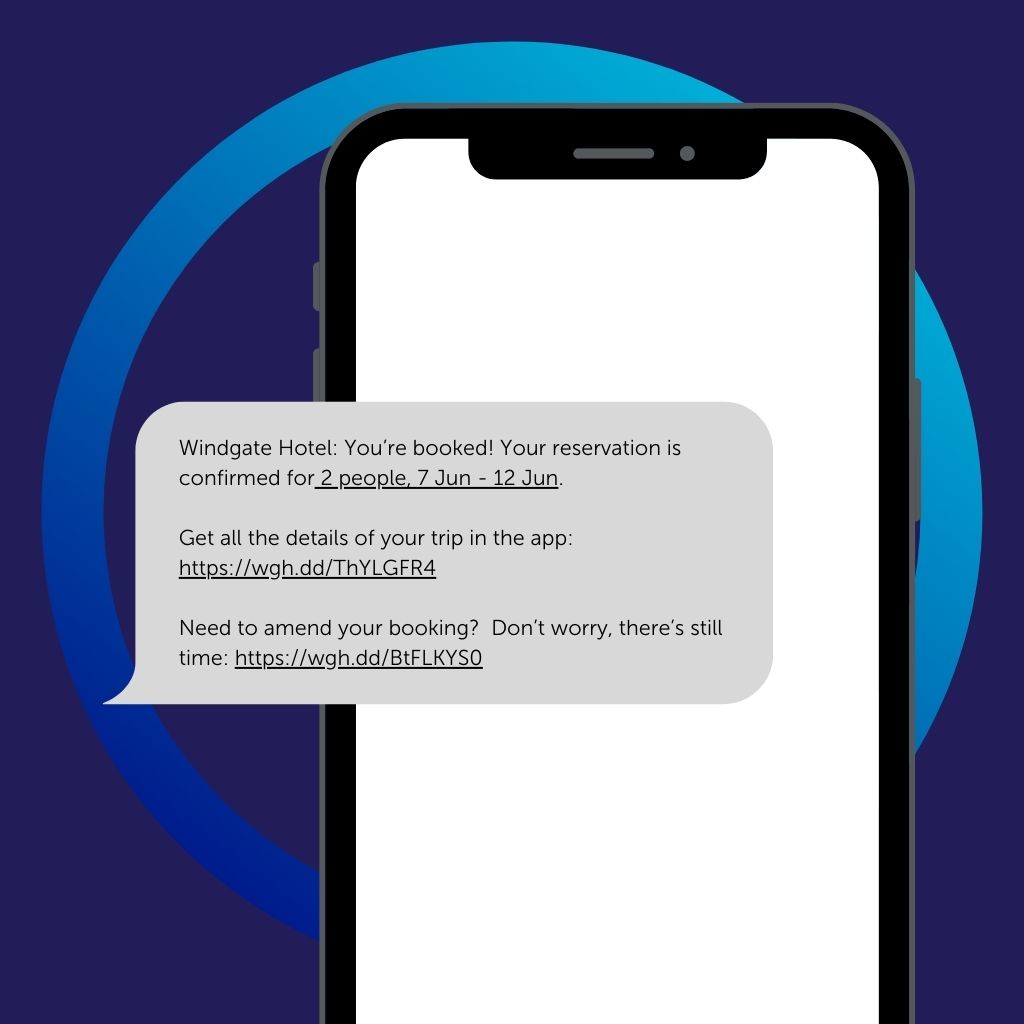
Send helpful reminders for upcoming trips, pre-travel checklists, departure times, locations, or travel document requirements.
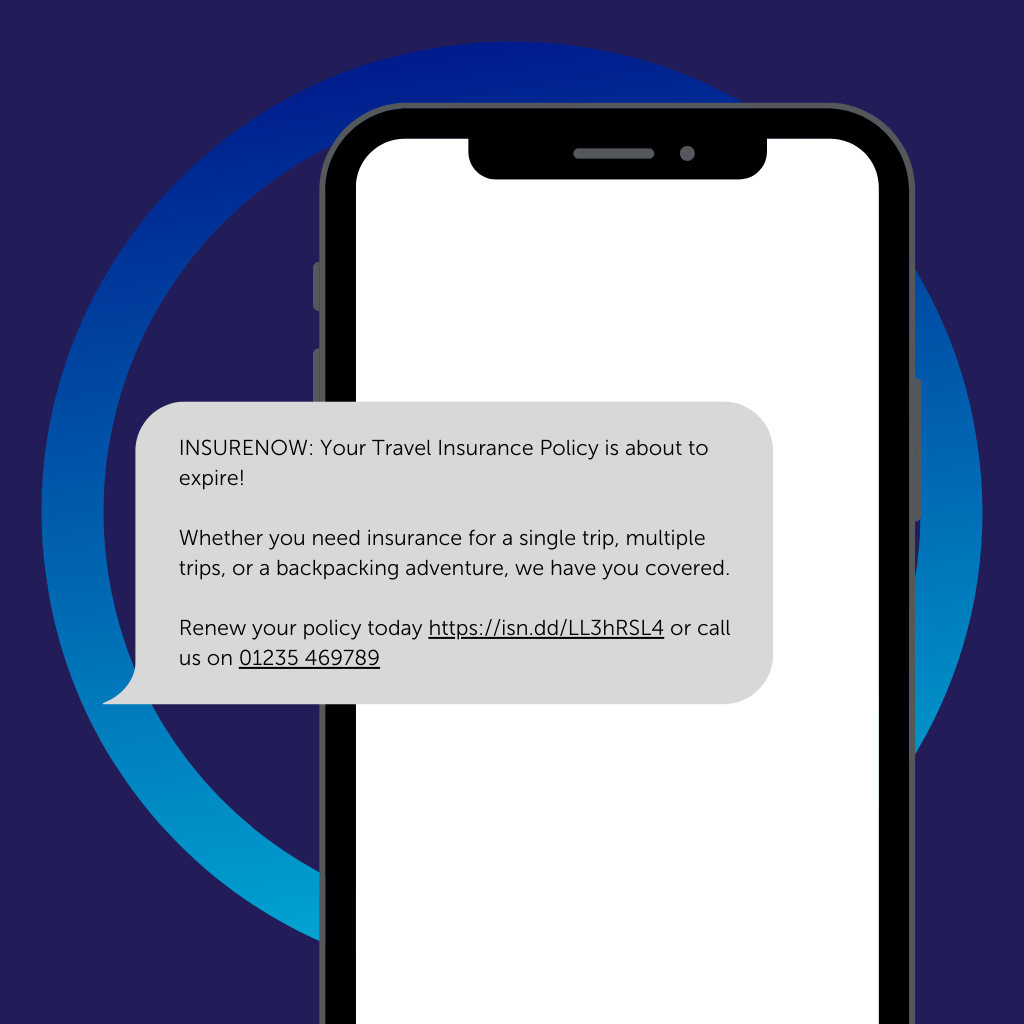
Share essential real-time updates like flight delays, gate changes, or itinerary adjustments, ensuring customers are well-informed and prepared. Ultimately, this will lead to higher satisfaction and experience overall.
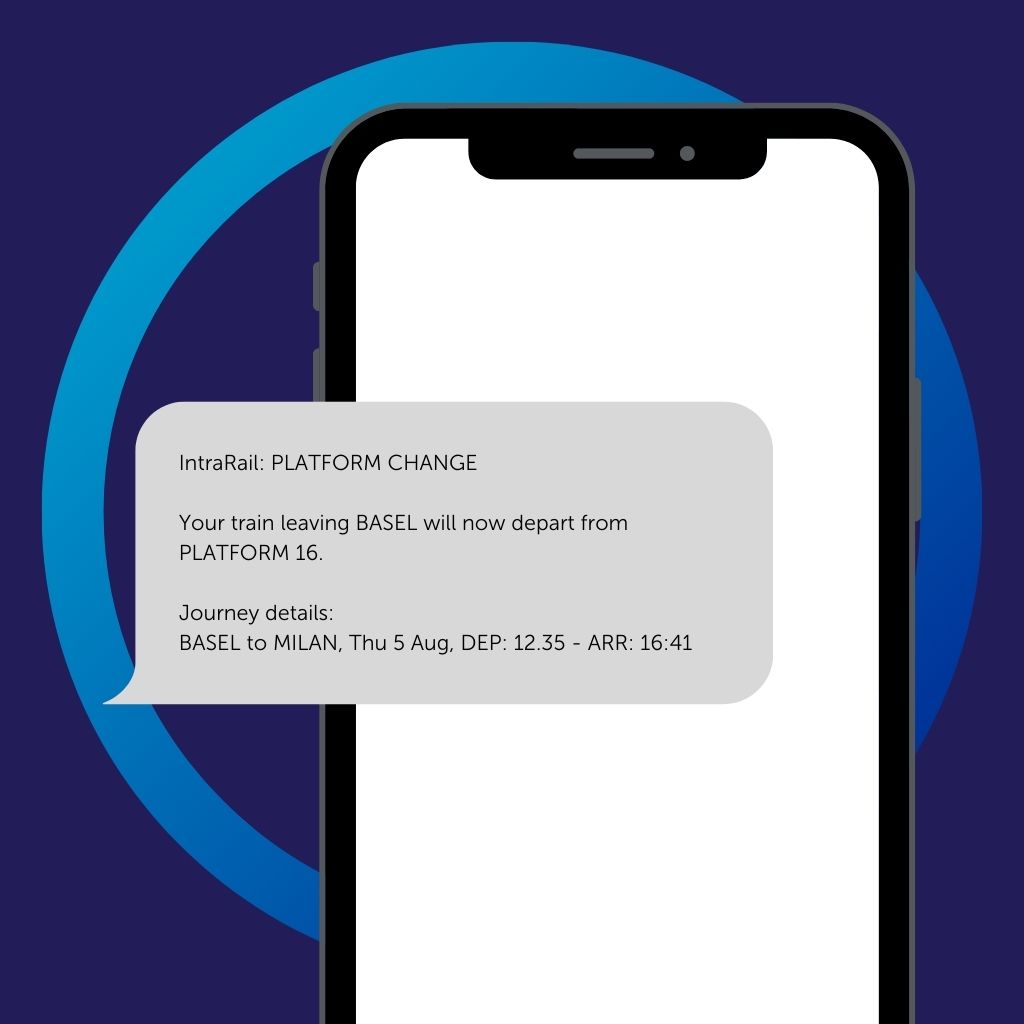
Send exclusive deals, discounts, limited-time offers, or last-minute specials to encourage customers to book travel or secure a service through your business.
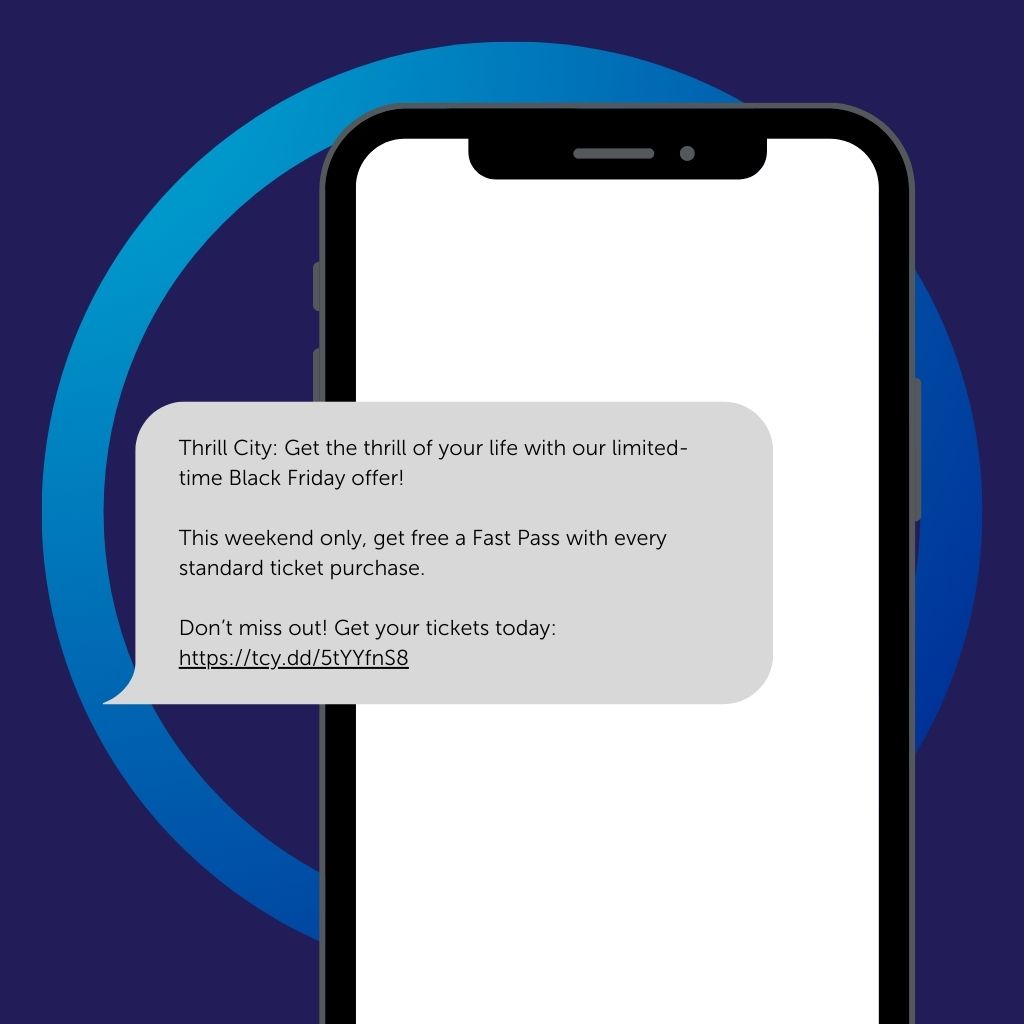
Remind customers about travel packages, accommodation options, or services they were considering but have not completed the booking process.
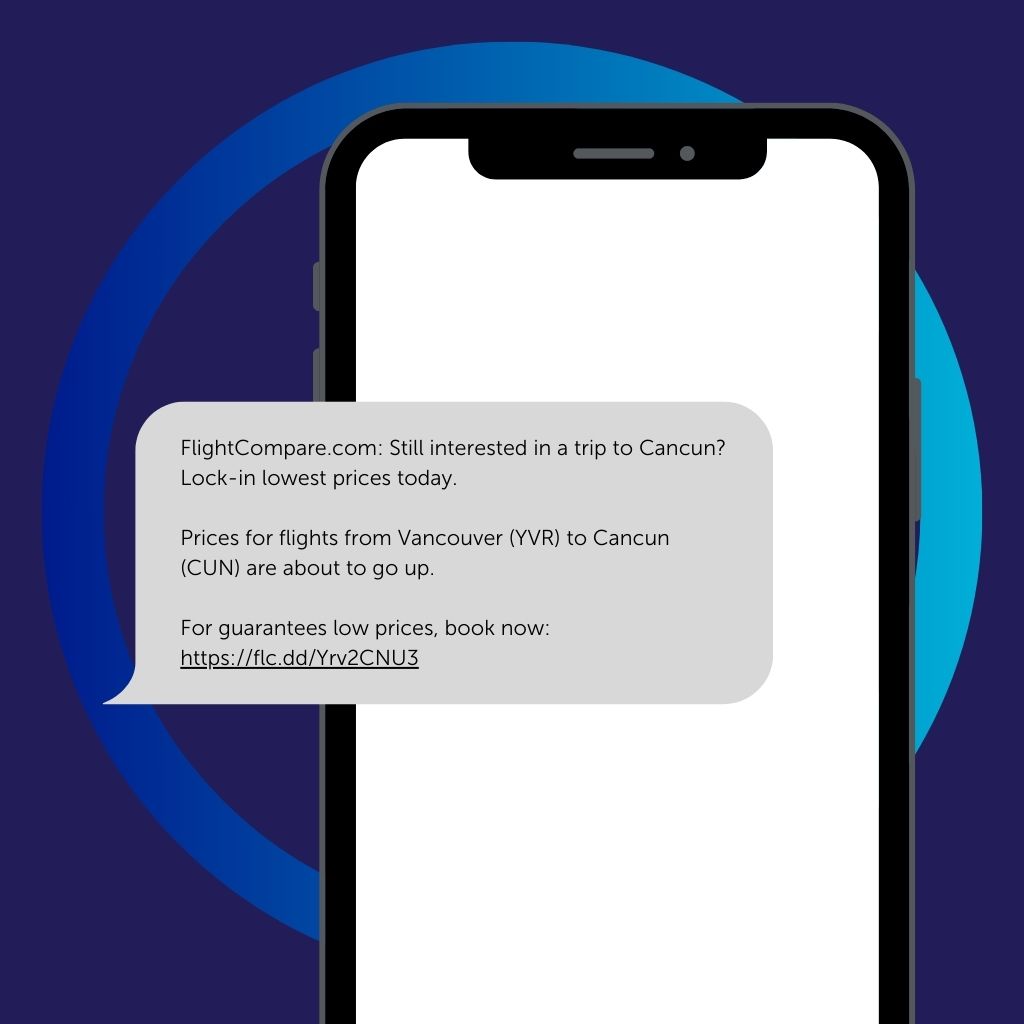
Suggest relevant add-ons or upgrades to customers based on their travel plans, such as excursions, activity bookings, premium seating, or transportation options.
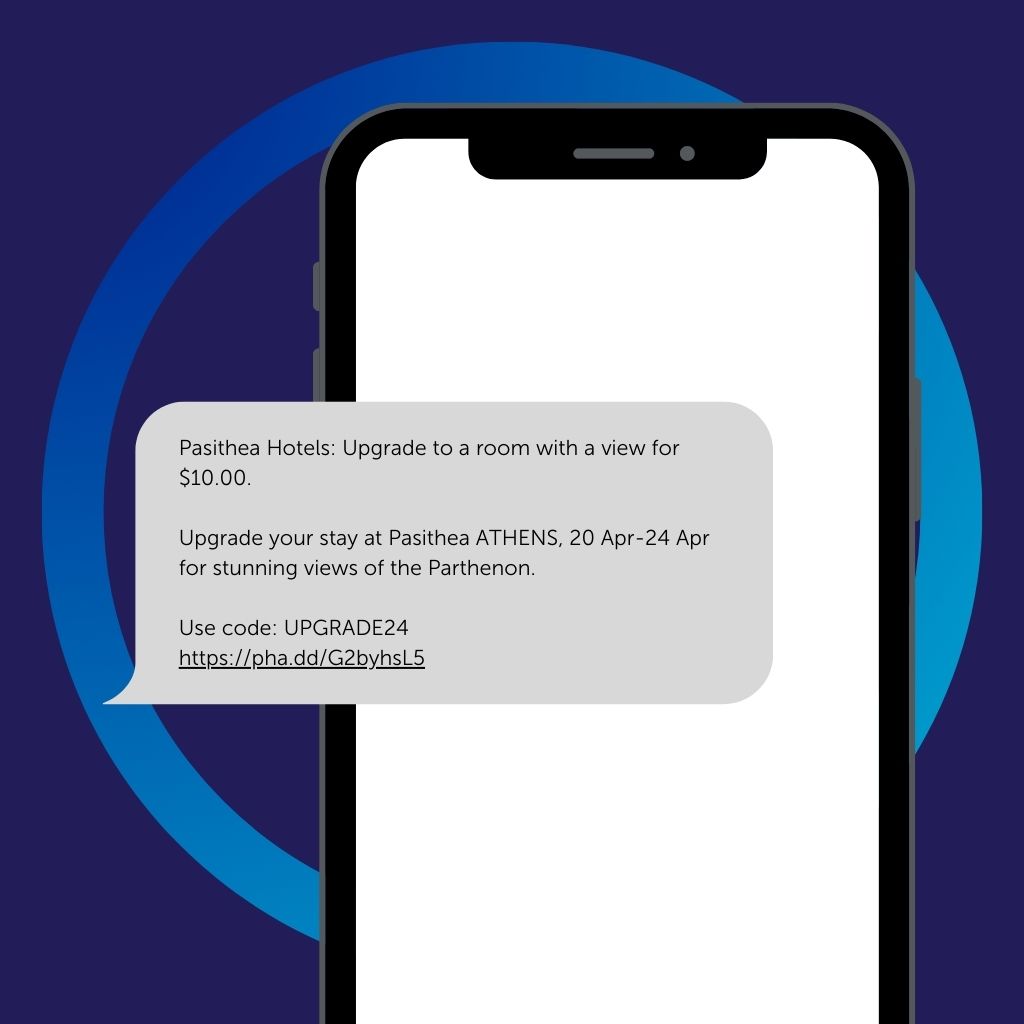
Request post-trip feedback, ratings, or reviews through an SMS message, using the insights to improve your services and customer satisfaction. SMS is a great channel for this because it requires little lift from your team and has a high completion rate.
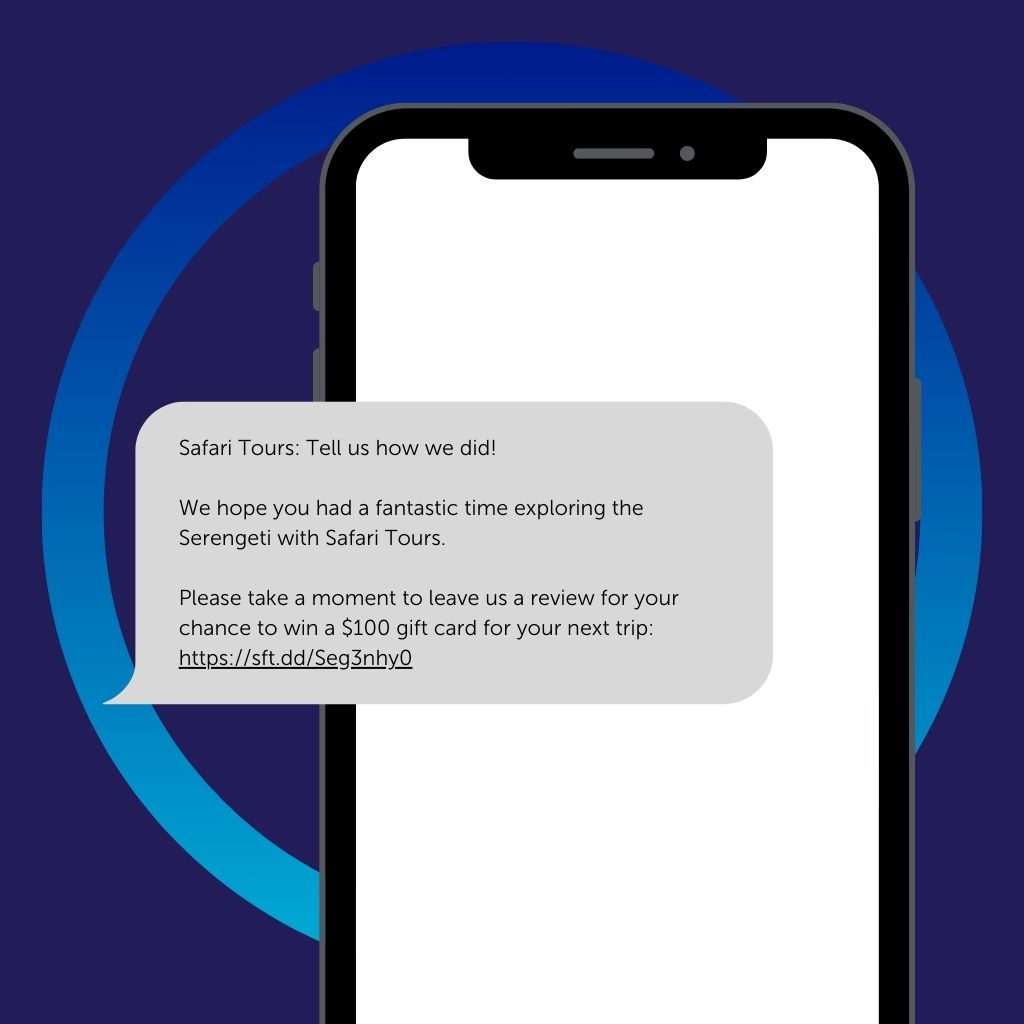
Notify customers of their rewards or loyalty points balance and inform them of any opportunities to earn additional points or redeem special offers.
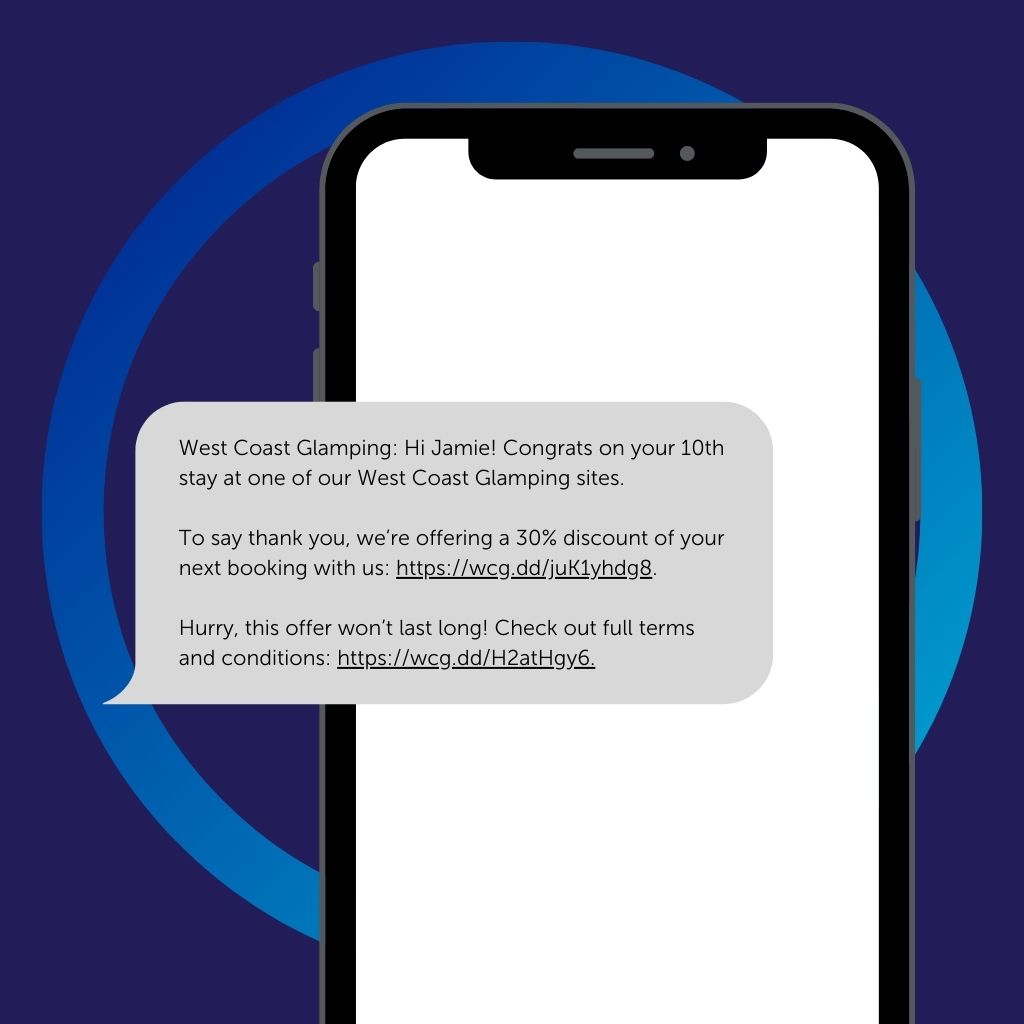
Share useful destination-based information, such as local attractions, events, dining options, or safety tips, to enhance your customers’ travel experiences.
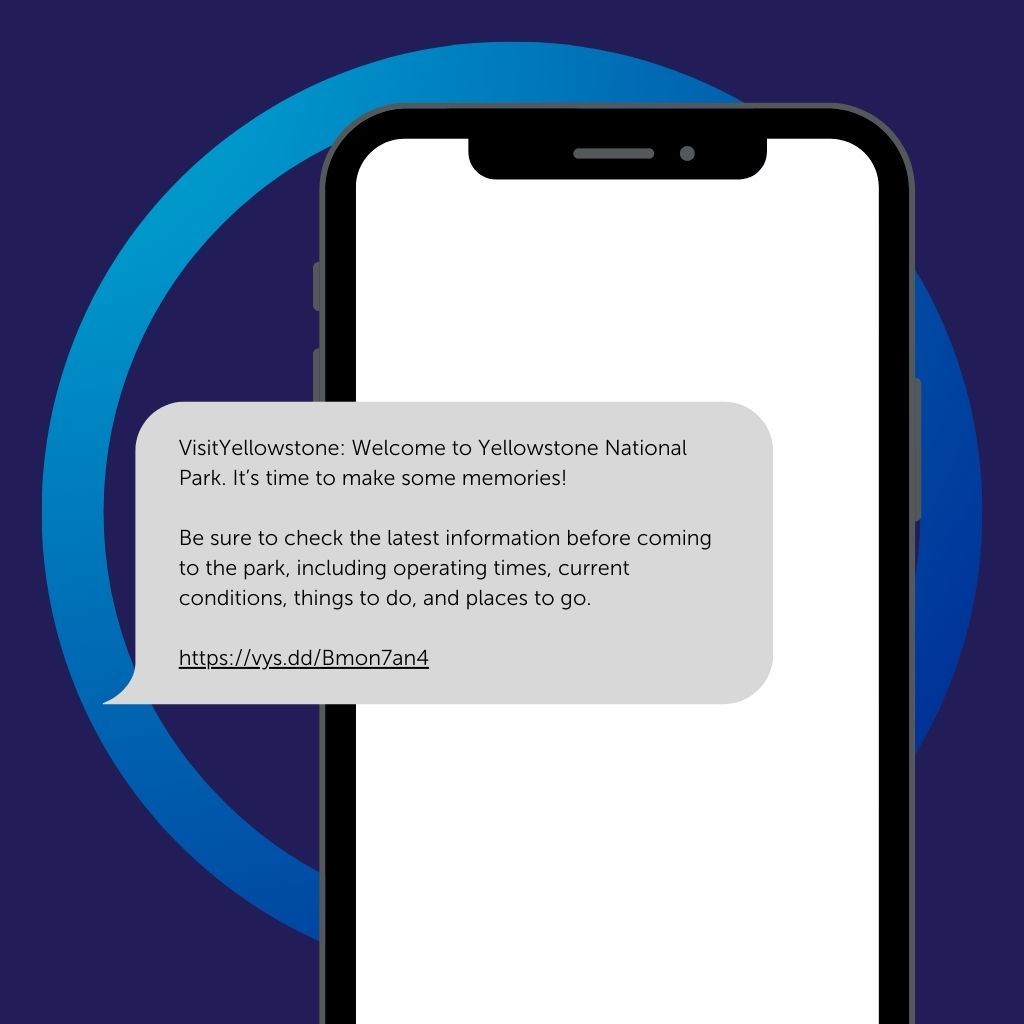
Top tips for successfully incorporating SMS into your travel marketing campaigns
- Combine SMS with email marketing
Integrate SMS marketing into your existing email marketing strategy, sending important alerts, reminders, or limited-time offers through SMS to complement your email marketing activity. - Segment your audience
Create targeted SMS campaigns based on demographics, geographic location, or travel preferences, ensuring that your messages resonate with subscribers and are relevant to their needs in the moment. - Personalize messages
Deliver tailored content and offers based on customers’ booking history, travel destinations, or preferences, creating a sense of exclusivity and personal connection. - Use automation
Use customer actions to trigger SMS marketing campaigns, such as booking confirmation, travel reminders, or payment due notices. This will ensure your text messages are landing at the best time to drive customer conversions. - Keep messages concise
Deliver the key message or the call-to-action within the constraints of the character limit. Stay concise, and focused, and ensure your message is easy to understand. Tap into AI tools to help.
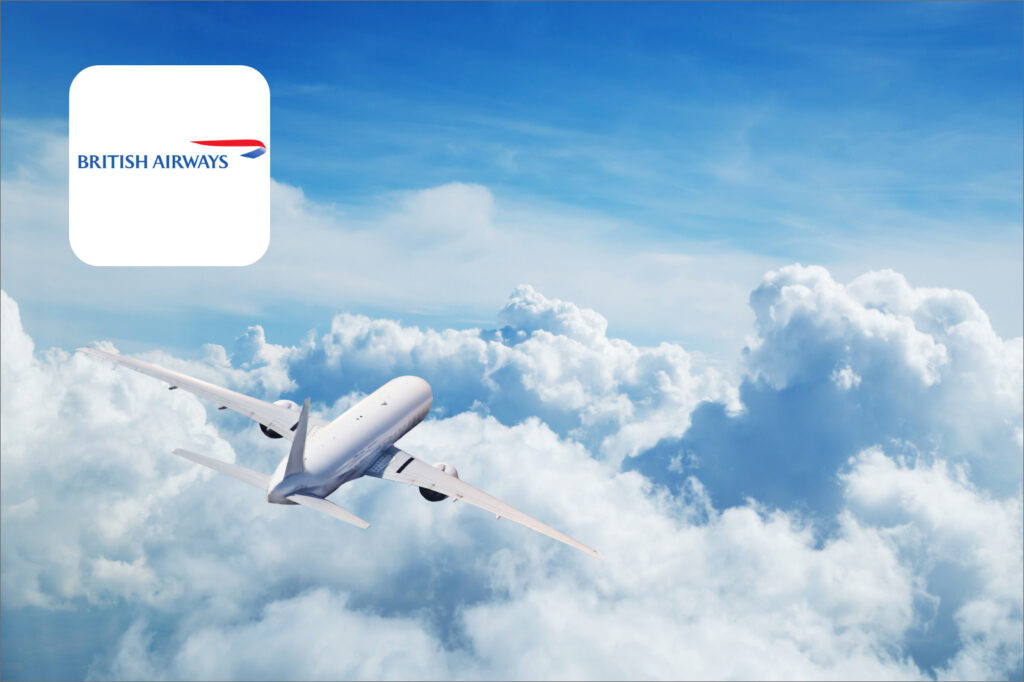
Using SMS for two-way communications
Discover how British Airways used Dotdigital’s two-way SMS functionality to encourage travelers to complete monthly customer satisfaction surveys.
MMS for travel marketing campaigns
MMS (multimedia messaging service) is a branch of SMS marketing that allows the sending of multimedia content, such as images, videos, and audio files, alongside text messages. It presents new and exciting opportunities to engage customers in a more dynamic and visually appealing way.
MMS allows you to send rich visual content, including high-quality images and videos that showcase destinations, accommodations, or activities. This allows customers to get a better sense of the travel experience being offered and will inspire them to book.
Multimedia messages, including images and videos, have higher engagement rates compared to simple text messages. By leveraging MMS, you can evoke stronger emotional responses and drive customer interest, resulting in increased conversions and bookings.
MMS helps you to create immersive narratives by sharing pictures, videos, or audio clips of real travel experiences. This storytelling approach can help build a connection with potential travelers, increasing the likelihood of them engaging with your brand.
MMS can be customized based on individual preferences, interests, or travel history. By sending personalized multimedia content to customers, you can create a more relevant and memorable connection, ultimately fostering brand loyalty.
Although MMS adoption is growing, many businesses still primarily rely on text-based marketing. By being an early adopter of MMS, you can differentiate yourself from competitors and establish a unique brand identity in the minds of consumers.
MMS works well in conjunction with SMS, email, and social media campaigns. Integrating MMS into your overall marketing strategy can help create a comprehensive and cohesive approach that covers different stages of the customer journey.
Marketing automation for travel marketers
Marketing automation streamlines and optimizes repetitive marketing tasks, leading to enhanced efficiency, reduced manual efforts, and improved results. Intelligent marketing automation tools like Dotdigital create conversion-driving, loyalty-inspiring experiences by tapping into customer data and turning it into real-time marketing campaigns.
Benefits of marketing automation for travel brands
1. Time-saving and cost-efficiency
Marketing automation significantly reduces manual tasks associated with campaign management and customer segmentation, freeing up time for you and your teams to focus on strategic tasks, such as content creation and performance analysis.
2. Seamless communication
Marketing automation ensures regularly scheduled and consistent communication with customers across different channels. This is essential for maintaining customer engagement and building long-term brand loyalty.
3. Personalization
By tracking customers’ actions, preferences, and booking history, marketing automation tools help you deliver personalized and relevant content that resonates with your target audience. This moments-based approach to marketing enhances the overall customer experience, improving ROI, average order value (AOV), and customer lifetime value (CLV).
4. Cross-channel campaign management
Marketing automation platforms help you manage and coordinate campaigns across various channels, such as email, SMS, social media, and web push notifications, ensuring a seamless and cohesive marketing strategy.
5. Data-driven insights
With the help of detailed analytics provided by Dotdigital, you can make data-driven decisions, monitor campaign performance, and optimize your strategies for maximum results.
Essential automation programs for travel brands
Set up automated welcome emails or messages for new subscribers, providing an initial introduction to your brand, exclusive offers, and personalized travel recommendations based on their preferences.
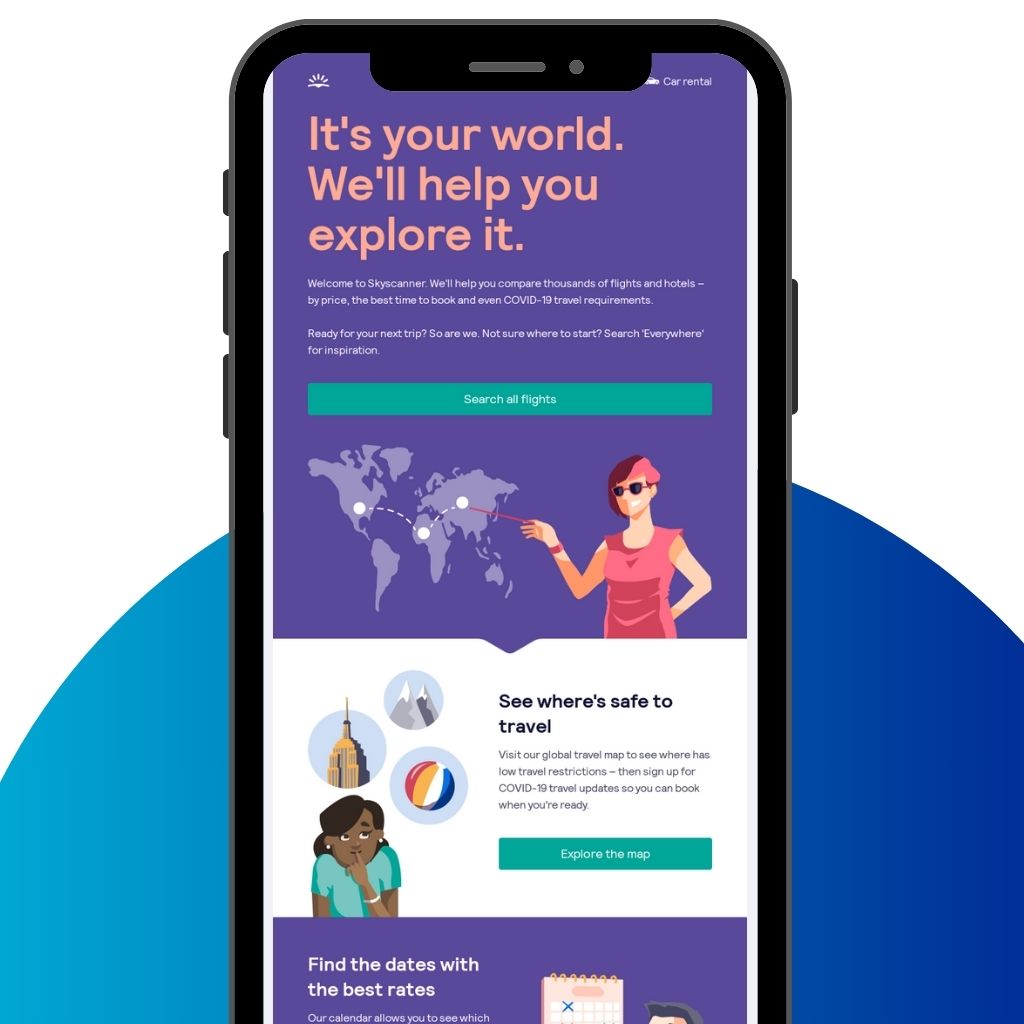
Automate booking confirmations, reservation details, and pre-travel reminders, ensuring all necessary information reaches the customer on time. This can include flight check-in reminders, pre-trip preparation tips, and travel documentation requirements.
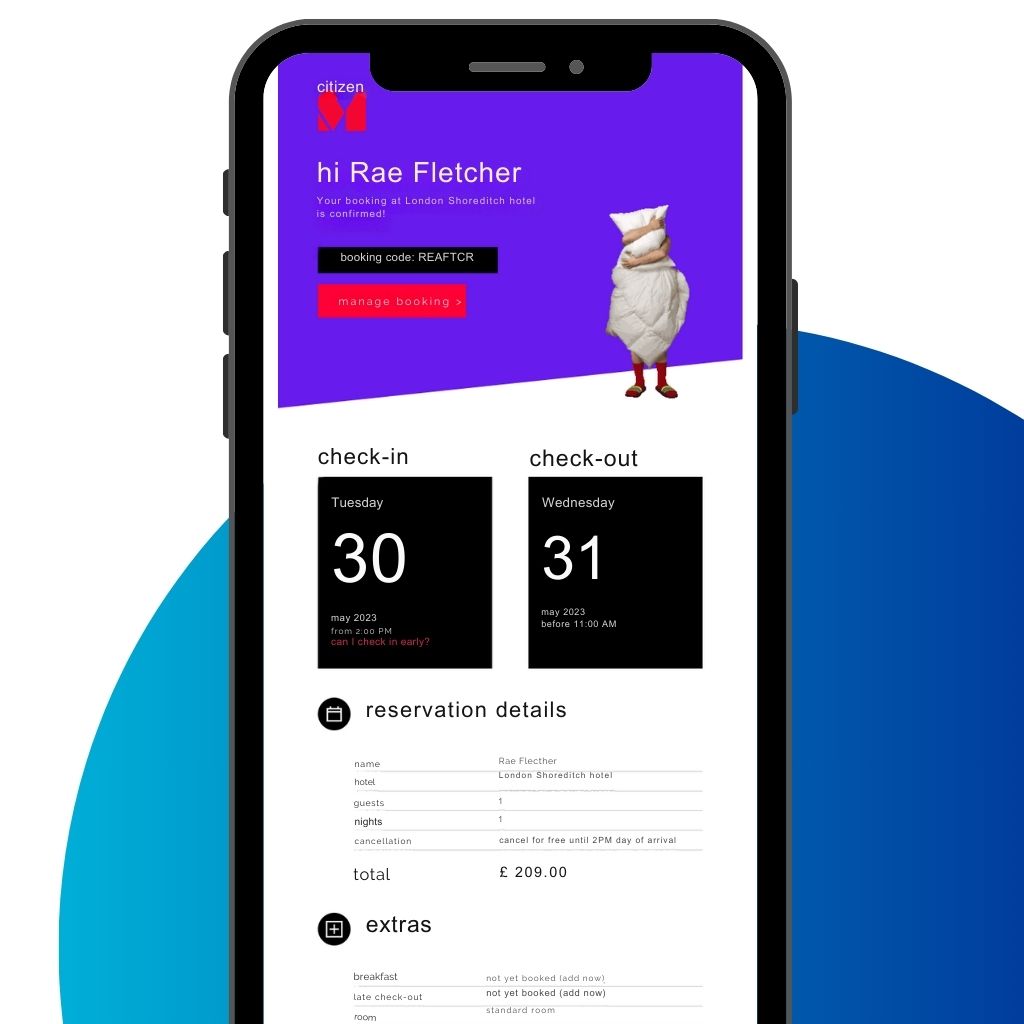
Implement automated messages for customers who added travel packages or services to their cart but didn’t complete the booking process. These messages can include personalized incentives or offers to encourage conversion, AI-powered recommendations, or exclusive discounts for high-value customers.
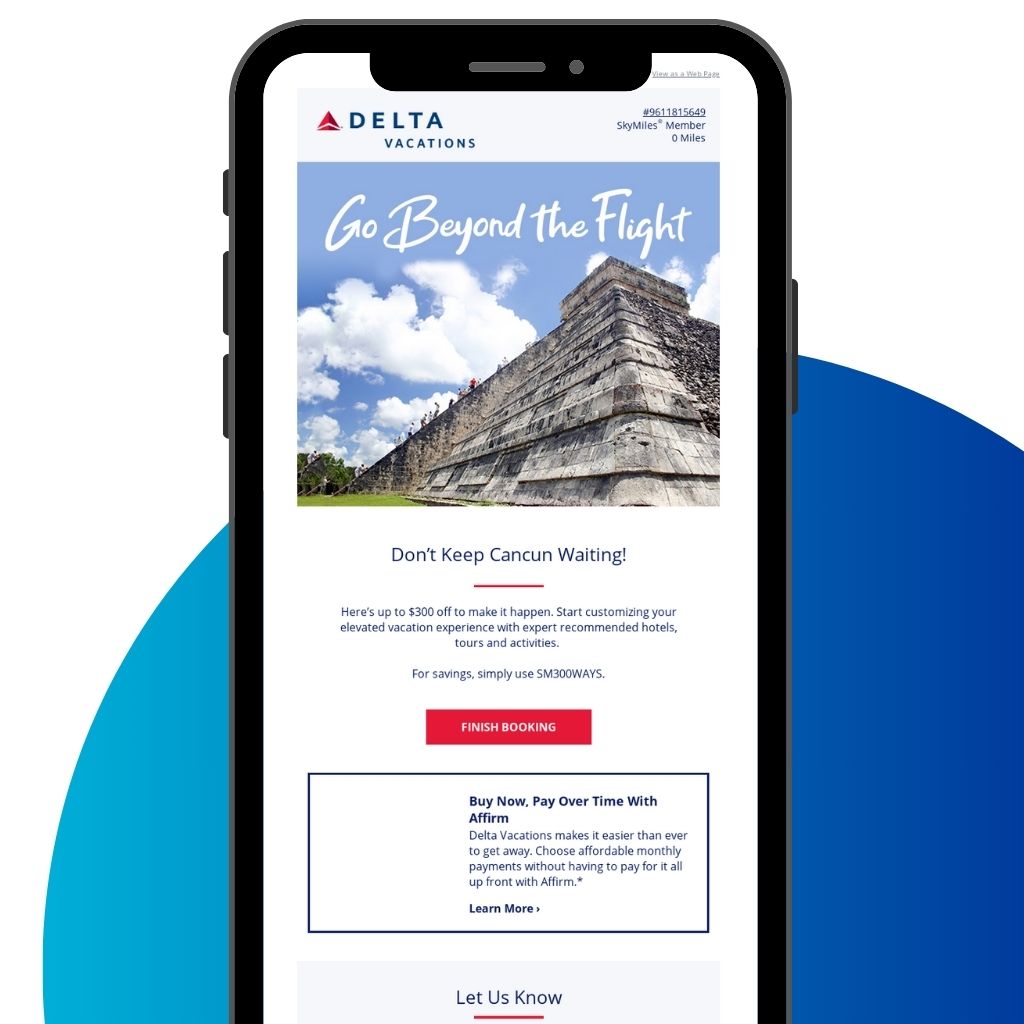
Build automated re-engagement or nurture campaigns to connect with inactive or lapsed customers, offering relevant travel deals or content that sparks renewed interest in your brand. Use eRFM to identify these customers and SCV to gain insight into the channels and content that will drive them toward conversions.
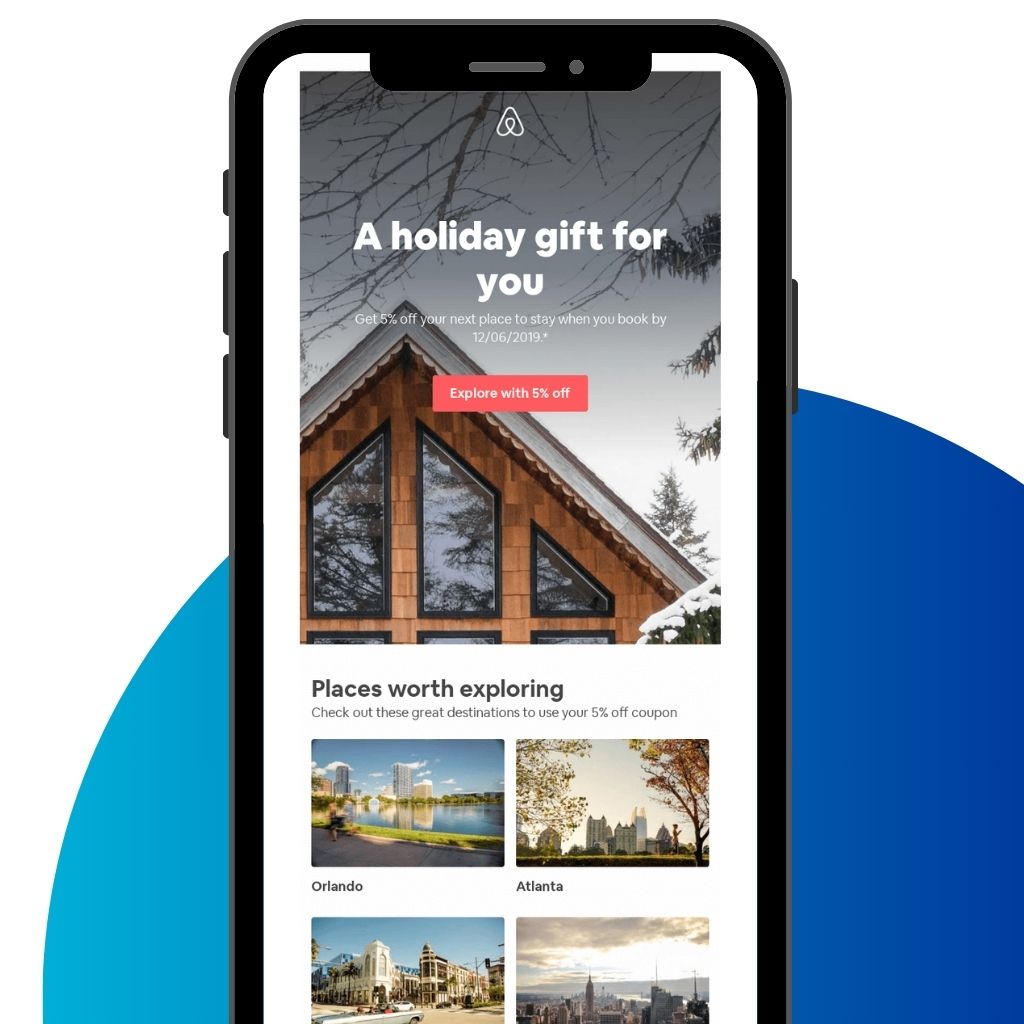
Loyalty programs are a big motivating factor in the decision-making process of modern travelers. Automate loyalty program updates, notifications, or special offers to reward repeat customers and enhance long-term brand loyalty.
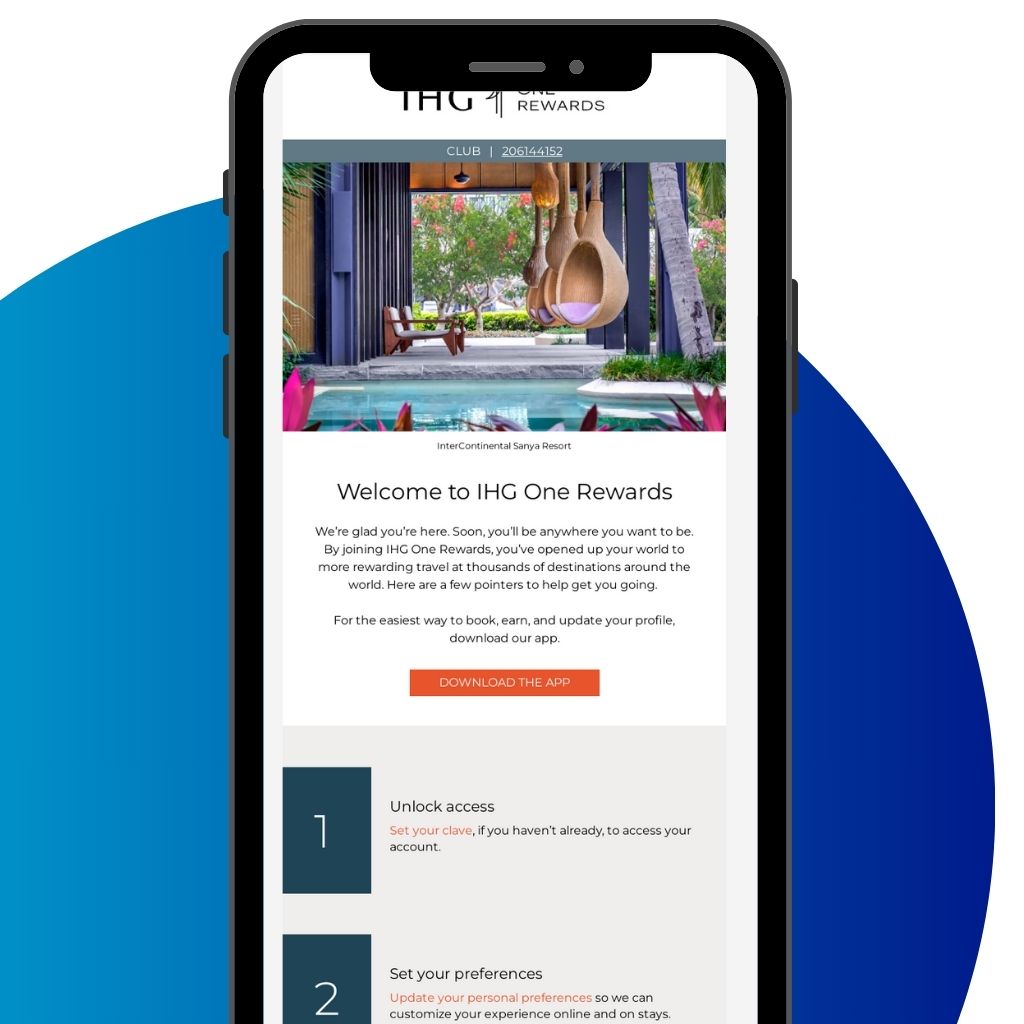
Automate post-trip feedback requests, analyze customer experiences, and collect valuable insights to inform improvements in your offerings and services. Positive reviews also make great marketing collateral so the importance of this program must not be underestimated.
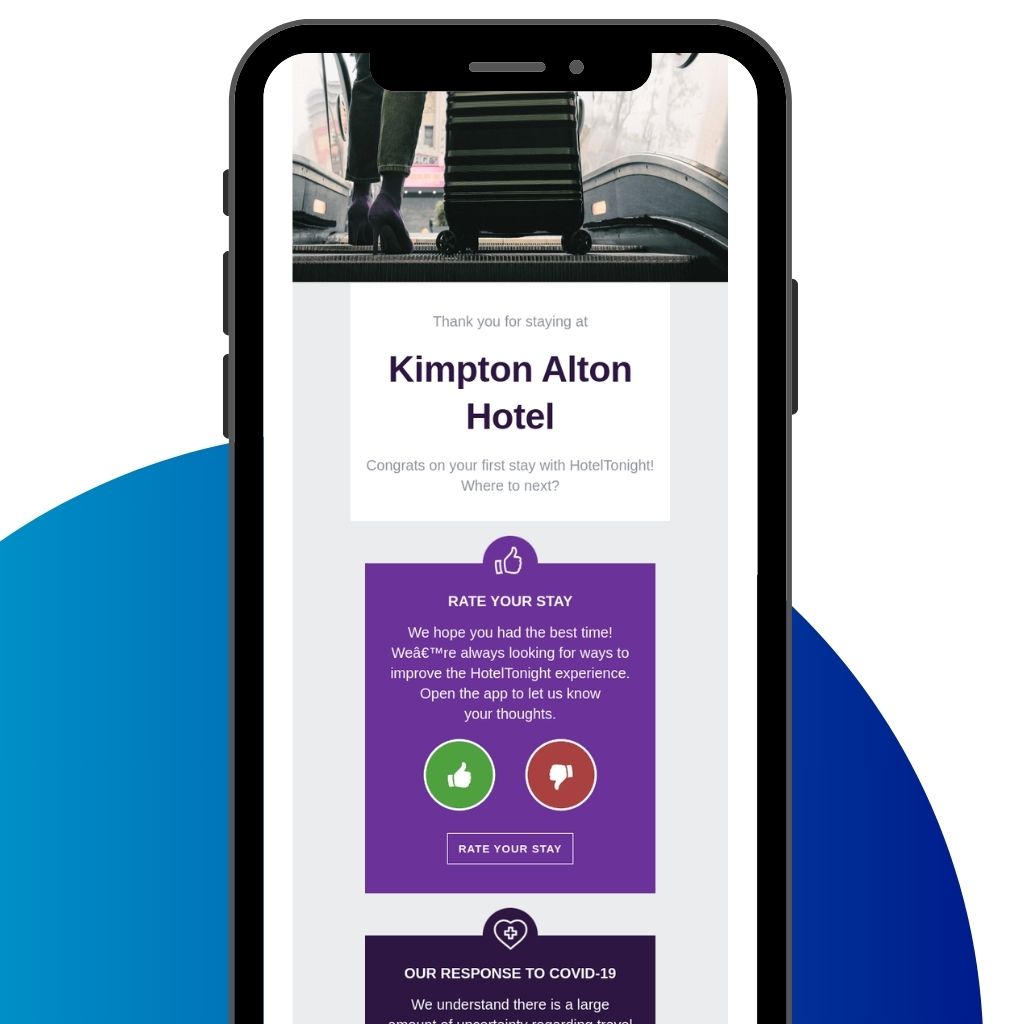
Schedule automated campaigns centered around holidays, seasonal offers, or special events, targeting customers with relevant deals and packages. Use customer insights to see when customers are most engaged or typically looking at your website to identify essential times to launch annual offers.
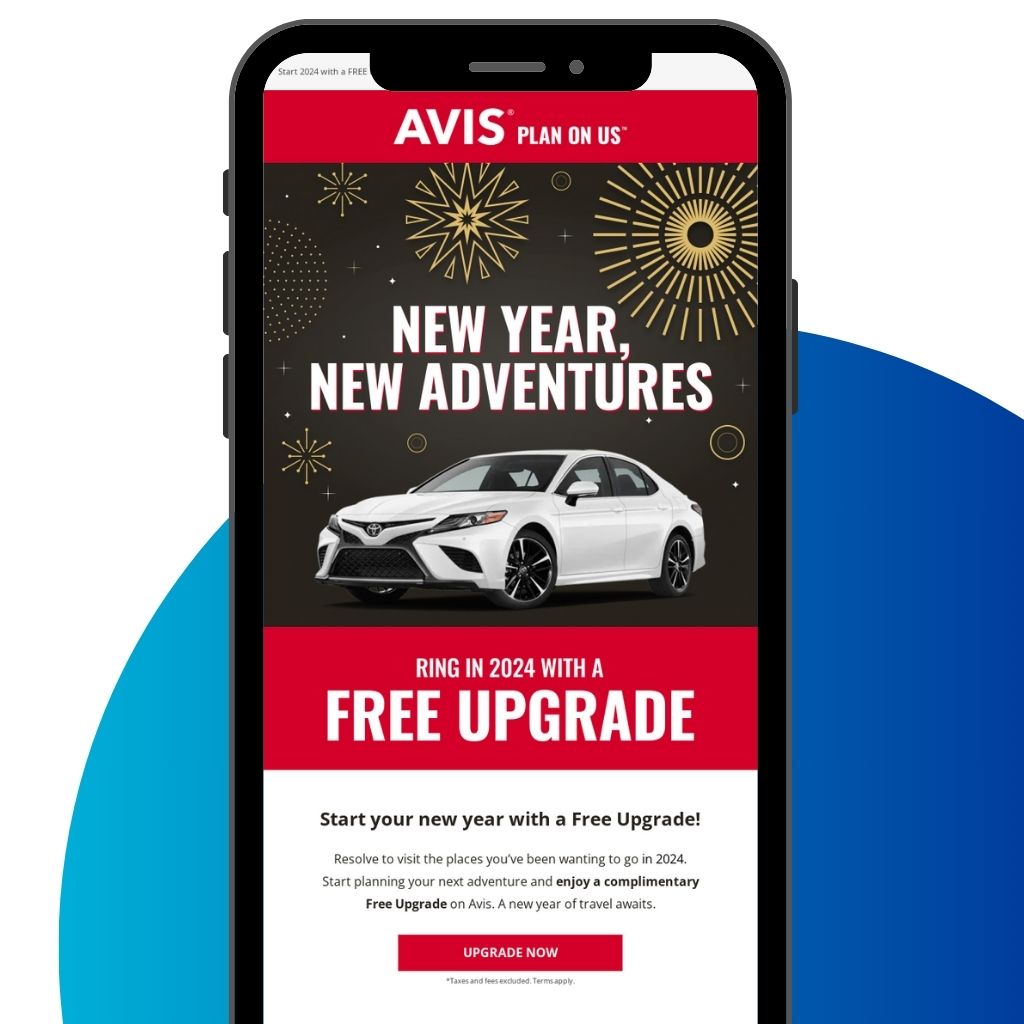
By understanding the benefits of marketing automation and implementing these recommended automation programs, you can streamline your marketing efforts, engage customers across multiple touchpoints, and enhance the overall customer experience while driving revenue and brand loyalty.
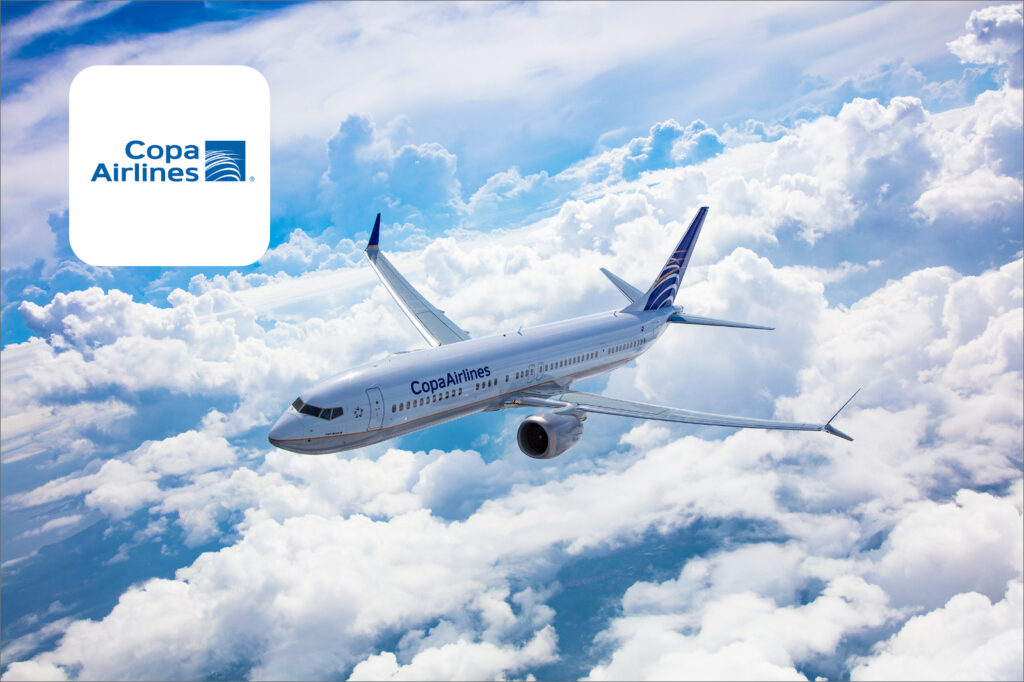
Marketing automation in action
Discover how international flight operator, Copa Airlines used Dotdigital to streamline its automated marketing communications to deliver a significant increase in revenue.
Web personalization for travel marketing teams
Web personalization involves tailoring website content to individual visitors based on their preferences, behavior, and demographic data.
In the travel industry, web personalization offers significant benefits and opportunities for enhancing customer engagement and boosting conversion rates. In this section, we’ll discuss the advantages of web personalization for travel marketers and provide strategies to create personalized online experiences.
Benefits of web personalization for travel marketers
1. Enhanced customer engagement
Personalized content and offers on your website can capture users’ attention and create a positive, engaging experience, increasing the likelihood of bookings and purchases.
2. Improved relevance
By addressing customers’ preferences and needs, web personalization ensures that your website’s content remains relevant and tailored to each user, making your brand more appealing to potential customers.
3. Increased conversion rates
Personalized content, offers, and recommendations can lead to an increase in customers taking action, whether booking a trip, subscribing to newsletters, or requesting more information.
4. Reduced bounce rates
An engaging and personalized website encourages visitors to spend more time exploring your offerings, reducing bounce rates and increasing the chances of customer conversions.
5. Improved ROI
By delivering personalized content and experiences to specific segments, web personalization can result in better use of marketing resources and a higher return on investment.
Strategies for personalizing web experiences
Show customers recommended travel destinations, offers, or services based on their current location, accounting for local events or geographic preferences.
Leverage customer behavior, such as browsing habits, pages visited, or previous booking history, to deliver personalized content, deals, or recommendations.
Divide your website visitors into specific segments based on demographics, interests, or travel preferences, and tailor website content to cater to these segments.
Implement exit intent pop-overs with tailored, last-minute offers or incentives that persuade visitors to book, subscribe, or engage further with your brand before leaving the website.
Use dynamic content that adapts based on user interactions, website behavior, or previous travel bookings, recommending related destinations, accommodations, or activities.
Employ remarketing campaigns that display personalized ads to users who have previously visited your website, featuring customized offers, messages, or promotions.
Integrate AI-driven recommendations into your website, providing visitors with personalized travel options across your homepage, product, and service pages.
Create dedicated, personalized landing pages for various promotions or travel offers based on customer segments, increasing the chances of conversions and bookings.
Push notification marketing for travel brands
Push notification marketing is a powerful tool for brands operating in the travel industry. It allows you to engage with customers directly through real-time, targeted, moments-based messages delivered directly to users’ mobile devices or web browsers.
Benefits of using push notifications in your travel marketing
1. Increased engagement
Push notifications give you new opportunities to re-engage customers by sending personalized promotions, announcements, and reminders. Ultimately, this enhances customer interactions and brand connection.
2. Real-time communication
Timely and relevant notifications help you to communicate instantly with users, facilitating real-time updates on special deals, flight status, itinerary changes, or exclusive offers.
3. Higher conversion rates
By delivering tailored offers and targeted content, push notifications can increase conversion rates, driving bookings and encouraging customers to take action.
4. Improved user experience
Push notifications can enhance the user experience by offering personalized recommendations, location-based offers, and immediate assistance, fostering a stronger bond between customers and your brand.
5. Trackable performance metrics
Push notifications offer valuable performance insights, such as open rates, click-through rates, and conversion rates, helping you optimize campaigns and improve future marketing efforts.
Reporting and analytics for travel marketers
For marketers in the travel industry, maximizing efficiency and leveraging your budget and resources effectively is crucial. Utilizing advanced reporting and analytic tools can streamline and optimize your digital marketing efforts.
Advanced analytics and reporting tools
Email reporting and analytics
Email reporting and analytics provide insights into the performance of your email marketing campaigns. This information helps you to:
- Identify trends in your email marketing campaigns
- Ensure your campaigns are meeting their objectives
- Pinpoint areas that need optimization to enhance campaign performance
Email dashboards
Email dashboards provide you with an overview of all your email marketing campaigns, while email reports focus on a single campaign, outlining key performance metrics. By getting a bird’s eye look at your email marketing campaigns, you can discover:
- Statistics about your delivered, bounced, and skipped emails.
- Data about opens, unique opens, non-opens, and social shares.
- A heat map showing the areas of the world where your email campaign was most opened.
- The most popular links in your campaign, clicks, unique clicks, and click-to-open rates.
- Details about your winning and losing split tests.
SMS reporting
SMS campaign reports monitor channel performance, enabling you to continuously improve your marketing results. These reports showcase:
Helps track the frequency of SMS campaigns and analyze performance metrics over time.
Measures the effectiveness of your campaign, comparing the number of clicks to successfully delivered messages, which can inform improvements in content or targeting.
Indicates the percentage of recipients who completed a desired action, such as booking a trip or signing up for a newsletter, helping to evaluate the success of promotional efforts.
Evaluates the total revenue generated by a specific SMS campaign, determining ROI and guiding budgeting decisions.
Provides insight into the revenue generated from bookings or purchases influenced by an SMS campaign, even if completed through different channels.
Informs segmentation strategy by showing the number of segment groups targeted in the campaign, helping you assess the depth and breadth of your reach.
Indicates engagement with SMS content by revealing the number of clicks on embedded links, allowing you to better analyze which messages resonate best with your target audience.
Measures the reach of an SMS campaign by tallying messages successfully received, helping to gauge overall marketing effectiveness.
Provides an overview of SMS campaign volume, enabling evaluation of the relationship between quantity and campaign success.
Program analytics
Dotdigital’s program analytics tools offer several benefits to travel marketers, especially by helping you optimize your marketing automation programs and maximize campaign impact. Key benefits include:
Program analytics provide a comprehensive and data-driven overview of your marketing automation programs, allowing you to make informed decisions about marketing strategies and tactics.
The visual representation of the different nodes in your marketing automation workflow enables you to gain a deeper understanding of your programs and quickly identify areas that require optimization.
Dotdigital’s program analytics tools allow you to monitor the performance of your marketing automation programs in real-time, enabling you to quickly adapt to changing trends and make necessary adjustments.
The detailed view feature allows you to choose between different chart views (trend and cumulative) to get a granular analysis of key program metrics, providing insights tailored to your specific needs.
By evaluating the performance of start nodes, decision nodes, and action nodes, you can better understand customer interactions and optimize your marketing automation programs to increase effectiveness.
Program analytics tools can help you identify the success of different segments and decision paths in your automation workflows. This allows you to refine your targeting strategies and drive better results.
The ability to analyze the detailed data and insights provided by program analytics tools enables you to streamline your efforts, eliminate inefficiencies, and allocate resources more effectively.
By providing in-depth data and insights on marketing automation programs’ performance, program analytics tools can help you optimize campaigns to maximize ROI. Through continuous improvement, marketers can generate better results and higher revenue, ultimately improving the overall ROI of their marketing efforts.
Advanced revenue attribution
Advanced revenue attribution is a method used to calculate the revenue generated by email and SMS marketing campaigns, based on clicks that lead to a purchase within a specified conversion window. Unlike direct tracking, which attributes revenue to clicks within a single window, advanced revenue attribution provides a more accurate and comprehensive assessment of how a campaign may have influenced the customer’s purchasing decision.
The benefits of using advanced revenue attribution include:
By tracing revenue to specific email and SMS campaigns, you can better assess the true influence of your marketing efforts on customers’ purchases, even if the purchase occurs outside the one-hour window of direct tracking.
Advanced revenue attribution offers a more complete picture of how different touchpoints contribute to your customer’s decision-making process, enabling you to optimize your campaigns for higher engagement and conversion rates.
Visibility into campaign performance through revenue attribution helps you to allocate budget and resources more effectively, focusing on campaigns that deliver the most significant ROI.
You can analyze the performance of email and SMS campaigns side by side, determining which channel is more effective at driving revenue and adjusting your marketing strategies accordingly.
By understanding which campaigns generate higher revenue, you can refine your targeting and segmentation strategies to engage the right audience with relevant and persuasive messaging, resulting in higher conversion rates.
Advanced revenue attribution can reveal patterns in customers’ behavior over extended periods, helping you identify crucial touchpoints for nurturing long-term relationships and customer loyalty.
WinstonAI™️ marketing intelligence engine
Designing a successful marketing campaign is far from easy. Especially in the ever-evolving travel sector, you must stay ahead of your competition. Embracing artificial intelligence (AI) at this early stage and leveraging it in your day-to-day marketing will improve the efficiency and effectiveness of your marketing efforts.
Benefits of early AI adoption
1. Perfect personalization
AI ensures you offer highly tailored experiences to your customers. By analyzing a vast amount of customer data, AI can identify patterns and preferences that are crucial for the creation of personalized marketing campaigns. As a result, your customers are more likely to be engaged and satisfied with their overall experience.
2. Data-driven decision making
AI-driven analytics provides you with actionable insights and data that help you make informed decisions. Early AI adopters can use powerful tools that analyze customer behavior, identify trends, and provide valuable recommendations. This ensures that your marketing resources are optimally allocated and drives higher ROI.
3. Time and cost efficiency
Adopting AI early on helps to streamline and automate your routine tasks. As AI can process a vast amount of data quickly, it saves time, increases productivity, and greatly reduces human errors. This frees up your time to focus on higher-value strategic and creative tasks.
4. Real-time optimization
AI provides real-time performance tracking and optimization opportunities for your marketing campaigns. By continually monitoring and adjusting, you can optimize your outreach methods, ultimately enhancing customer engagement, conversions, and revenue.
5. Competitive edge
Early AI adopters in the travel marketing sector will stay ahead of the competition by leveraging technologies that many competitors may not even be aware of. This provides a unique opportunity to gain market share and establish a brand reputation as a forward-thinking, innovative business.
WinstonAI capabilities
WinstonAI is Dotdigital’s industry-leading marketing intelligence engine, designed to simplify your daily marketing activity. Its ever-growing capabilities help you save time, money, and effort, further streamlining your market teams’ outputs.
Effortlessly create compelling content with WinstonAI’s innovative features, which include:
- Subject line assistant: WinstonAI helps elevate your subject lines by analyzing past engagement rates and generating inspiring suggestions for your next travel campaign.
- Email campaign assistant: WinstonAI not only offers alternative subject lines but also provides valuable feedback to refine your content. Get insights on tone evaluation and creative suggestions for your upcoming email campaigns.
- Grammar and spell check assistant: Eliminate time-consuming manual proofreading by using WinstonAI’s grammar check for emails, SMS, landing pages, and forms.
- One-click email to SMS generator: Save time by repurposing valuable email content into SMS messages for subscribers who prefer text messages. WinstonAI achieves this with just one click.
Transform your data into insightful actions with WinstonAI’s powerful analytics capabilities:
- Predictive analytics: Anticipate your customers’ behavior and adapt your marketing strategies accordingly, ensuring continuous engagement throughout their journey.
- eRFM segments and opportunities: Develop a deeper understanding of your customer base by integrating engagement scores with RFM (recency, frequency, monetary) ratings to create distinct personas.
- SCV and lookalike segments: Engage deeply with individual customer profiles using single customer view and generate segments with similar traits to your ideal customers.
Maximize your outreach potential and ensure your messages land at just the right moment with WinstonAI:
- Send time optimization: Enhance engagement levels by utilizing AI-driven send time optimization (STO) to deliver emails at the most opportune moment for the recipients.
- Automated reputation manager: Improve campaign performance and sender reputation by employing top-quality data that WinstonAI continuously monitors and evaluates.
- Watchdog data importer: WinstonAI’s data watchdog acts as a vigilant guardian of your sender reputation by safeguarding your delivery rates and thoroughly analyzing incoming email addresses.
- Non-human interaction (NHI) filtering: WinstonAI filters out activity from security tools or bots that can skew marketing results, providing you with a more accurate assessment of your campaigns’ performance.
Integrations and data management for travel marketers
From your booking systems and CRM to ticketing and customer service software, tech stacks for travel brands are vast and spiraling. The only solution is to have a customer experience and data platform that connects and unifies all your systems into a single source of truth. This will help you provide seamless and personalized customer experiences, streamline operations, and enable relevant and timely marketing activity.
Key integration and agency partners
CRM systems allow you to manage and analyze interactions with potential and existing customers. This helps to maintain and improve customer retention, satisfaction, and revenue generation. Integrating your CRM and marketing channel providers ensures you have all the data you need to provide data-driven marketing campaigns.
Integrations with booking platforms and reservation systems are crucial for streamlining traveler information management, allowing you to personalize offers and communications based on booking history and preferences.
Ticketing systems are vital for travel brands as they help manage and streamline customer support inquiries, leading to enhanced customer experiences. Integrating these into your marketing platform empowers cross-team collaboration, ensures timely communication, and improves customer retention as every interaction is accessible for marketers and customer service teams alike.
Loyalty programs play a significant role in retaining customers and enhancing brand loyalty for travel brands. Integrating these systems into your marketing platform helps you tailor rewards and offers to customers based on their preferences, purchase history, loyalty points, and other relevant data. Personalized rewards lead to higher customer satisfaction and engagement, strengthening brand loyalty.
Integrations with review platforms such as TripAdvisor, Feefo, and Trustpilot enable you to monitor customer feedback, identify areas for improvement, and showcase highlighted reviews to increase credibility and trust.

Integrations that deliver results
Discover how the Australian tourism board, Visit Victoria used Dotdigital’s Zapier integration to segment, personalize, and automate tailored cross-channel re-targeting campaigns.
Conclusion
Travel businesses need to understand the different types of marketing channels and tactics available to them to effectively promote their products, services, and experiences. By utilizing innovative strategies, personalized promotions, and data-driven insights, travel businesses can stand out from the competition, attract new customers, and retain existing ones.
The travel industry is constantly evolving, and you need to keep up with the latest trends and technologies to succeed in the highly competitive market. With the right marketing strategy in place, travel businesses can capitalize on the current post-COVID travel boom and take advantage of the many opportunities available in the industry.
